Reform leaders are frustrated with Democrats who have pushed aside the “defund the police” call that’s central to protests against police brutality after George Floyd’s killing.
Posted on June 18, 2020

BuzzFeed News; Getty Images
In President Donald Trump's presentation, all Democrats "have gone Crazy" and cannot wait to "DEFUND AND ABOLISH" police departments across the country.
In reality, Democratic leaders from Joe Biden down have virtually no interest in the call to “defund the police” that’s become a central demand of weeks of nationwide protests against police brutality after the killings of George Floyd and Breonna Taylor.
Police reform leaders are as frustrated with Democrats as the president is outraged. They want party leaders to reconsider and worry that if they don’t, the country will be trapped in another cycle of ineffectual reforms leading to no real changes and more police killings of Black people.
“The Democratic Party and all of its institutions are experiencing a ‘What side are you on?’ moment,” Maurice Mitchell, the national director of the Working Families Party, told BuzzFeed News. “It’s a very binary moment. It’s rare where a society is experiencing a moment that’s so ethically clear. We’re in one now, where you’re either on the side of human rights and Black lives or you’re committed to business as usual, which is preserving a status quo that’s indifferent to Black lives.”
Grassroots activists and younger Democrats who have spoken with BuzzFeed News this week say they’ve been disappointed in party leaders — including Biden, Sen. Bernie Sanders, and Black Congressional leaders including Rep. Jim Clyburn and CBC Chair Karen Bass — as they’ve watched them swiftly turn away from those conversations, emphatically rejecting the idea of defunding police as they face immediate attacks from Republicans.
“When I think about the bread and butter of the Democratic Party, I think of Black women who show up election after election,” said Charlene Carruthers, a Chicago-based author and organizer with the Movement for Black Lives.
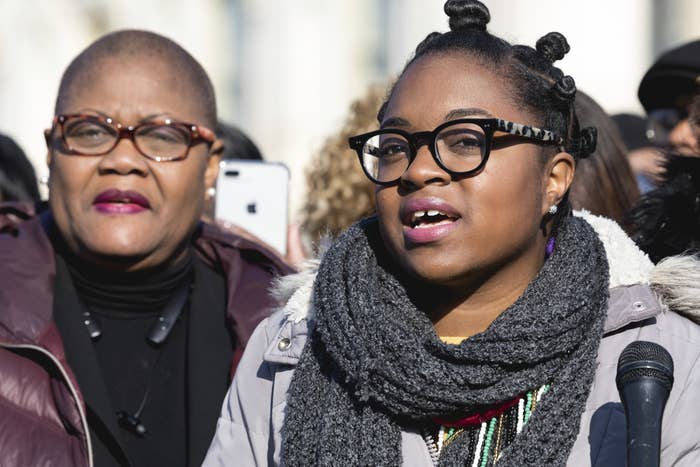
Cheriss May / Sipa USA via AP
Charlene Carruthers (right), speaking at the news conference for the Black Womenʼs Roundtable Summit, at the US Capitol, March 15, 2018.
Many Black women, Carruthers said, “are calling for divestment from policing. We’re the ones who show up, and we’re calling for investment in our communities. That is a core demand for us. So If they want to remain in these positions of power, it would behoove them to tune into and follow the leadership of the people who show up election after election.”
"To me it represents a vast disconnect between what people are seeing in communities across the country and people who have been elected to represent us," Carruthers added.
Adding to the difficulty of getting Democrats on board with defunding the police is the confusion about what exactly it means to “defund” departments — whether that means making federal funding conditional on reforms; taking some amount of funding away and redirecting it to community programs; or entirely defunding police departments as they stand today, redirecting those funds, and starting from scratch with a different conception of law enforcement, as Minneapolis now plans to do.
Biden, following goading from the Trump campaign, told CBS in an interview last week that he doesn’t support defunding the police, but instead backs “conditioning federal aid to police based on whether or not they meet certain basic standards of decency and honorableness.”
He has pointed to the criminal justice plan he released last summer, which includes adding $300 million in funding to community policing programs, in addition to services like summer programs and mental health and substance abuse treatment. Last week, he added four specific policies he’s now backing: a national use of force standard, greater accountability for police officers accused of misconduct, an end to the militarization of police forces, and a national ban on police use of chokeholds.
“Joe Biden understands that African Americans are in pain, and are tired of the systemic racism experienced in nearly every facet of society,” said Jamal Brown, Biden campaign national press secretary, in a statement to BuzzFeed News. “He believes we need to reform, train, and invest in the policing programs we know work to help protect and serve all communities. At the same time, he knows we need to invest in funding for schools, summer programs, homelessness services, and mental health and substance abuse treatment."
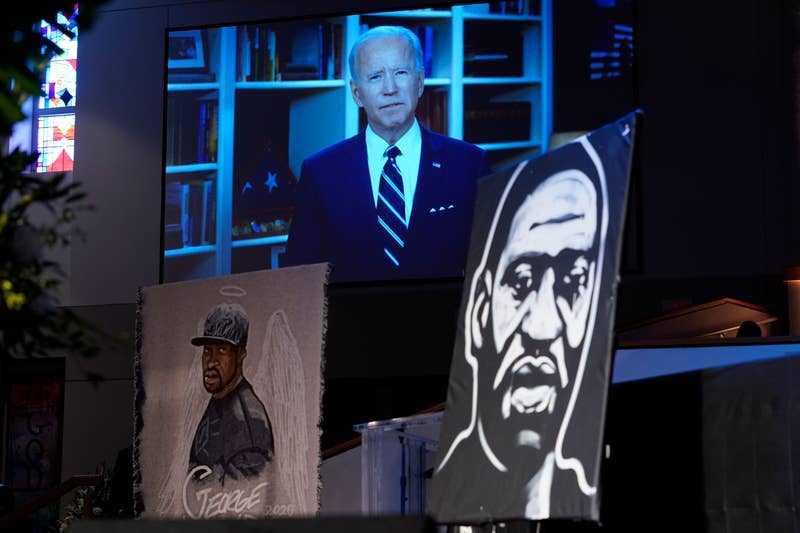
David J. Phillip / Getty Images
Biden speaks via video link as family and guests attend the funeral service for George Floyd at the Fountain of Praise Church in Houston, June 9.
Biden has said he supports a police reform package put forward by House Democrats, which does not defund police but bans chokeholds and creates a national police misconduct registry.
Sanders, in a recent letter to Senate Minority Leader Chuck Schumer, backed some of those same policies, and also said he’s against defunding police departments. He has said he instead supports more stringent oversight, raising police salaries to “pay wages that will attract the top-tier officers” and providing additional federal funding for training a “civilian corps of unarmed first responders to supplement law enforcement.”
Clyburn, a close Biden ally and one of the most powerful Black Democrats in Congress, reportedly instructed colleagues not to be “drawn into the debate about defunding police forces” and said in a TV interview that the focus should be on “reforming” policing.
Bakari Sellers, a former South Carolina state representative and author, thinks Clyburn, his member of Congress, is missing the point.
“The slogan sucks — I’m clear about that,” Sellers told BuzzFeed News of “defund the police.”
“However, the intellectual dishonesty that’s going on around young activists is eerily reminiscent of the ‘60s. People are changing places — those who fought and marched in ‘60 are now the ones chastising the movement today. Instead of engaging and bringing in activists, they’re pushing them away.”
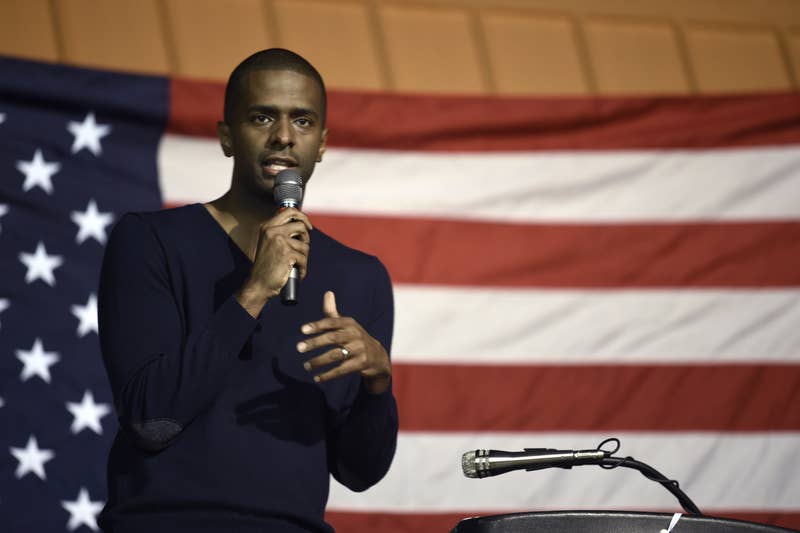
Meg Kinnard / AP
Former South Carolina House lawmaker Bakari Sellers.
“I know what they’re talking about when they say ‘defund the police’,” Sellers added. “I wouldn’t have chosen ‘defund,’ but I’m not going to sit here and say I don’t agree with it because I do.”
Sellers said that the party leaders need to start embracing the young activists on the ground who are calling for changes into how city budgets are structured. He urged politicians not to dismiss what they had to say because of the semantics of their slogan.
Part of what advocates want national leaders to understand is that there is a range of opinions on what police reform should look like. But many of the people working on criminal justice reform on the left agree that a central tenet of the work should be taking at least some funds and power away from police departments and redistributing those funds to community programs and emergency services like social workers and mental health professionals.
Some activists are full police abolitionists, and believe police should not exist in any form. Others say they want national and local leaders to drastically defund police departments, in some cases disbanding them in their current form, but creating some version of smaller and heavily regulated armed police divisions to respond to violent crimes.
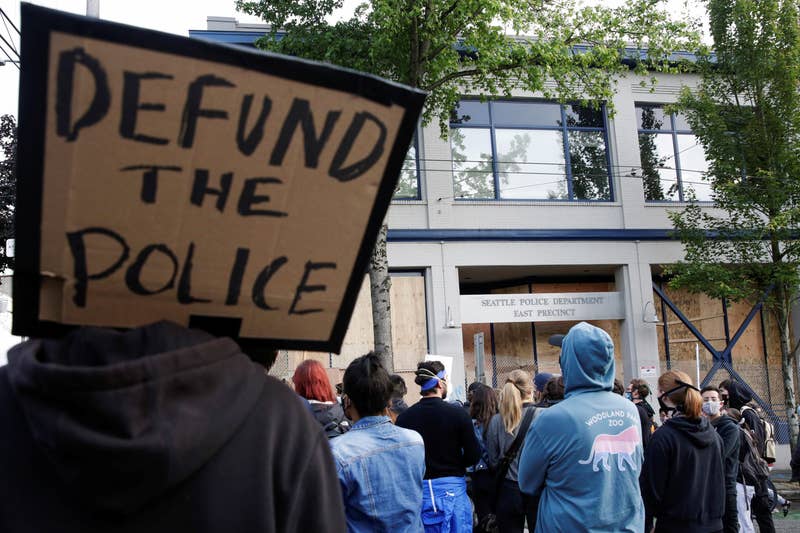
Jason Redmond / Reuters
A protester holds a sign that reads "defund the police" as people rally against racial inequality and the death of George Floyd, in Seattle, June 8.
Campaign Zero, a police reform group, released a platform in early June called #8CantWait, which it says would reduce police use of force by 72% through a list of policy changes that would ban chokeholds, require officers to use de-escalation techniques, use all other options before shooting, warn suspects before shooting, and commit officers to a “duty to intervene” when they witness another officer using excessive force.
Cities and local leaders across the country have embraced aspects of the program, like banning or restricting chokeholds and requiring warning before shooting, but many of those policies are already in place and failing in cities where police have continued to kill unarmed Black people.
“Every officer on the Minneapolis police force has received training,” Minneapolis city council member Phillipe Cunningham said on a call with reporters last Friday. “Those [measures] are not working.”
Nationally, recent polling shows that the idea of “defunding the police” is still unpopular with a majority of Americans. Polling from ABC News and Ipsos last week, in the wake of the protests, asked people, ”Do you support or oppose the movement to defund the police?”
Some 34% said they supported “defunding the police,” with that number increasing to 55% among Democrats and to 57% among Black people. The polling question doesn’t involve an explanation of whether defunding the police means taking some resources away or entirely disbanding police departments.
In another question, people were asked “Do you support or oppose reducing the budget of the police department in your community, even if that means fewer police officers, if the money is shifted to programs related to mental health, housing, and education?” That elicited a marginally more enthusiastic response, with 39% of people saying they would support such a move, increasing to 59% among Democrats and 64% among Black people polled.
To many activists and party insiders, even those who agree that the messaging of “defunding the police” will be politically difficult for Democrats in swing districts, disavowing the idea is not the answer. They say that’s missing the point of their years of work tracking police violence and developing alternatives, which require at the very least shifting some resources away from police to distribute to community programs.
“I get that in order to govern you’ve got to win. I don’t want to paint people with this sort of brush of righteousness,” said Stacey Walker, an Iowa Democrat and member of a “unity task force” on criminal justice reform composed of Biden and Sanders allies with the goal of devising policy for the Democratic Party’s platform.
“I just want us to work a little harder as a party to figure out ways that we can talk about things we can actually believe in,” Walker said, speaking for himself and not the task force.
Watching national Democrats rush to distance themselves from arguments to defund police has been especially frustrating for advocates in the wake of the Minneapolis city council’s move to disband its police force, after protests against the police killing of George Floyd placed a national spotlight on the city and the yearslong problems with its police department.
“It's unfortunate that we have a presidential candidate who is still raising up reforms that are not working,” Cunningham said on last Friday’s call. He added that he’s glad to hear Biden talk about investing more in community programs.
The plan in Minneapolis isn’t to immediately gut the police force without having a plan in place, city council member Jeremiah Ellison told reporters on the call.
“We’re going to make sure there are systems in place to address an active shooter situation, for example,“ he said. “We are not going to hit the eject button so to speak without a fully realized plan.”
While many of the decisions on how to allocate police funding ultimately fall to local authorities, advocates say where top Democrats place themselves in the debate has undeniable influence, and that some federal moves like incentivizing cities and states to direct federal funds toward community services like mental health outreach could make a big difference. ”It would be helpful if federally elected officials were encouraging this kind of work to happen at the local level,” Walker said.
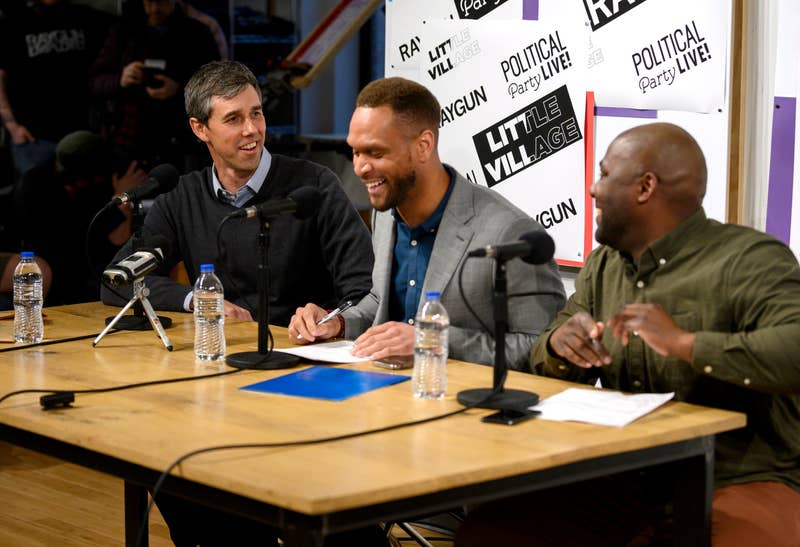
Stephen Maturen / Getty Images
Stacey Walker (center), with former Texas representative Beto O'Rourke (left) and Simeon Talley, recording an episode of the Political Party Live podcast at Raygun in Cedar Rapids, Iowa, March 15, 2019.
From what they’ve heard so far, they’re wary of Democrats proposing watered-down policies that don’t really get at the root of systemic police violence against Black communities.
The majority of proposals Democrats are backing right now, like demilitarizing police forces and funding community programs “fall completely short of what we’re demanding, and also fall completely short of addressing the systemic racist and racist violence of law enforcement,” said Carruthers.
Youth-led activist groups wrote to Biden recently asking him to adopt former presidential candidate Julián Castro’s police reform plan, because while it doesn’t defund police, it includes several more progressive reforms like banning stop and frisk and racial profiling.
Some criminal justice reform advocates said they see parallels with the movement to abolish Immigration and Customs Enforcement, which Democrats raced to show support for last summer before reeling back their enthusiasm as poll after poll showed the move to be unpopular.
“I think Democrats know in their heart of hearts that what ICE is doing is wrong and has no place in America, but the politics of it are tricky for some Democrats,” Walker said. “How they gain traction is through political pressure and that’s been the most successful tool for the left to date. And you find a number of ways of applying political pressure, and that also seems to be the only political tool that has any leverage.”
For some, it doesn’t add up for Democrats to have at least initially supported defunding one arm of law enforcement — ICE — but to not be able to commit to defunding police departments.
“The calls to abolish ICE and call out their abuses that were supported — EVERY politician and organization that supported those calls should be just as committed to defunding the police,” said Mitchell.
Mitchell said it’s on elected officials to come to the table and acknowledge the problems with police in Black communities stems from over-policing and how policing works in America, and that limiting the scope to “reform” isn’t enough.
“Democrats will turn around and they give you something lukewarm, you know, we’re talking about body cameras yet again or training yet again,” Mitchell said. “The story of Minneapolis is that they are one of the most reformed police departments and we still have this heinous crime because the fundamental problem is the police itself.”
“All of these things paper over the central problem,” he said.
Advocates have urged Democrats like Biden to sit down and listen to the range of ideas from activists who have been organizing in those spaces for years, rather than leaning on ideas like the #8CantWait program.
“Any set of policies for a broader political vision that are advanced in this moment that do not substantially take away resources, scope, scale, and power of law enforcement agencies, they are actually false solutions,” said Carruthers. “The issue is not simply with 8Can’tWait. It’s about, actually, a liberal trend to form Band-Aid solutions and false solutions to address a systemic problem.”
In a letter to Biden published on Monday, 50 progressives organizations including the Working Families Party, Black Voters Matter, and the Center for Popular Democracy Action urged Biden to listen to the policy proposals laid out by the Movement for Black Lives and reconsider his plan.
“We ask that you revise your platform to ensure that the federal government permanently ends and ceases any further appropriation of funding to local law enforcement in any form,” they wrote.
Activists pointed to a bill Rep. Ayanna Pressley introduced in Congress this week as an example of legislation that they say actually works toward structural change by taking police officers out of schools and reallocating those funds to school mental health and restorative programs.
“That particular bill shows that someone is listening to what we have to say,” Carruthers said. “I think that it’s aligned with our broader visions for Black lives.” ●
 Ryan BrooksBuzzFeed News Reporter
Ryan BrooksBuzzFeed News Reporter  Nidhi PrakashBuzzFeed News Reporter
Nidhi PrakashBuzzFeed News Reporter
No comments:
Post a Comment